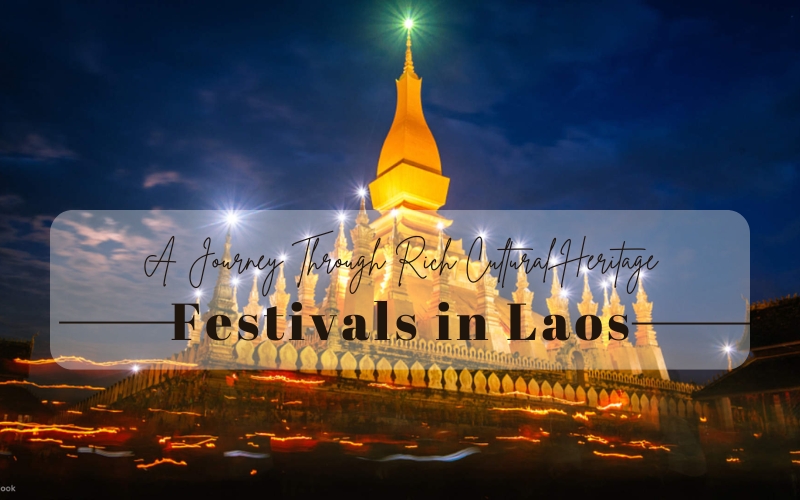
Festivals in Laos are a vivid expression of the country’s rich cultural and spiritual heritage, offering a unique insight into the lives and traditions of its people. For visitors, these festivals provide an unforgettable opportunity to experience the warmth, togetherness and timeless traditions of this remarkable nation.
General weather in Laos
Laos has a tropical monsoon climate with two distinct seasons: the dry season and the rainy season. In addition, the weather is also distinguished based on altitude and geography.
Seasons in Laos
Laos has two seasons, the dry season and the rainy season, each with its own weather characteristics. The dry season from November to May is the most comfortable time of the year with temperatures ranging from 15°C to 40°C (59°F to 104°F). The cool, dry weather and clear skies are perfect for outdoor activities such as sightseeing and exploring culture and nature, even in the hotter months from March to May, you can still participate in activities during the cool times of the day such as early morning or late afternoon.
The rainy season from June to October has temperatures still warm ranging from 25°C to 35°C (77°F to 95°F) and frequent showers, especially in the afternoon, which can affect your travel plans.
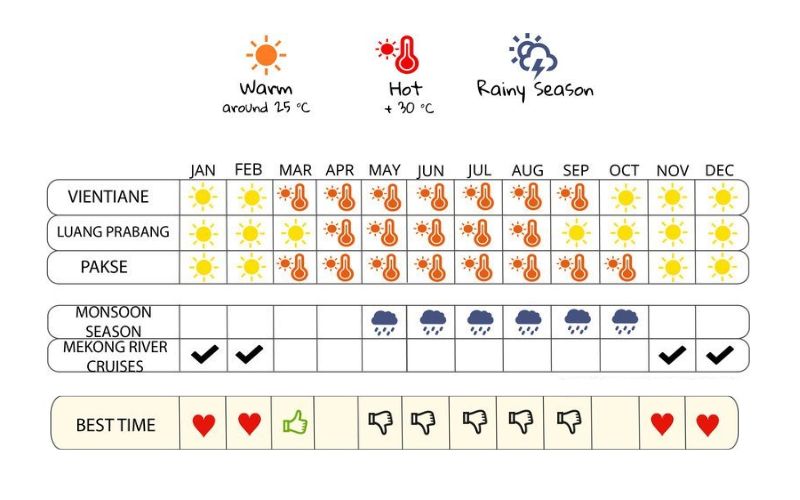
Laos Weather
Regional weather changes
The weather in Laos varies markedly due to the varied terrain. Northern Laos is generally cooler, especially in the mountainous areas, where nighttime temperatures can drop below 10°C (50°F). Central Laos is generally warmer and more humid. The hot season has exceptionally high temperatures, while rainfall during the wet season is moderate compared to the south. Southern Laos is the warmest region in the country. Temperatures during the hot season often exceed 35°C (95°F), and the wet season brings more rainfall than other regions, making the region particularly lush and vibrant during this time.
Planning your trip to Laos? Discover the best time to visit this enchanting country through this blog.
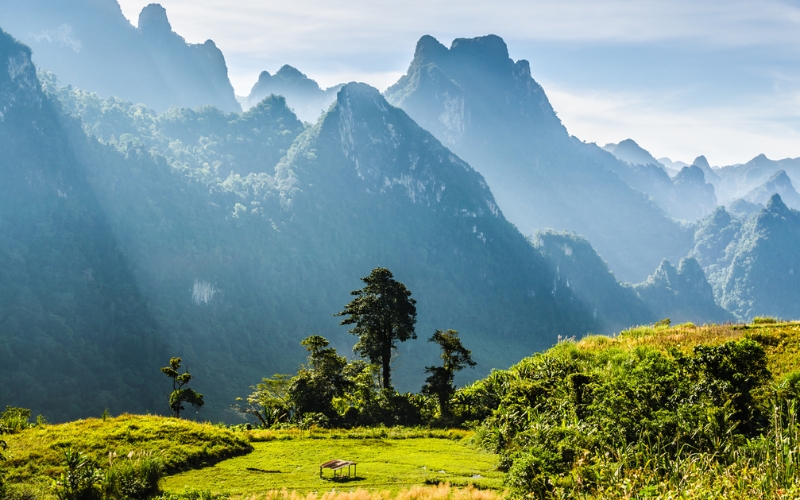
The weather in Laos varies markedly due to the varied terrain
Cultural Significance and Spiritual Roots
Laos is also known as the land of Buddhism with 90% of the population following Buddhism and more than 1,400 temples across the country. Laos has a series of rich traditional festivals, imbued with the cultural identity and beliefs of the country such as Bun Phavet, Bun Khao Phansa,… These festivals often revolve around the Buddhist lunar calendar, marking important religious milestones and aligning with the rhythms of agricultural cycles. This connection highlights the harmonious relationship between spirituality and everyday life in Laos, where festivals are seen not only as moments of celebration but also as opportunities for spiritual renewal and community bonding.
The festivals are mainly held at temples. This is not only a place to serve spiritual life but also a symbol of the solidarity and unity of people in Lao culture. People offer food, flowers, candles and incense to monks as a way to accumulate merit, which is believed to bring blessings and good karma. Besides religious rituals, this is also an opportunity for people to meet, have fun and create unique cultural experiences such as dancing, singing, performing,… For visitors, participating in these celebrations offers a unique insight into the Lao culture, providing a deeper understanding of the people and their way of life.
Explore the hidden gems of Southeast Asia with our Laos tours, offering unforgettable adventures tailored to every traveler.
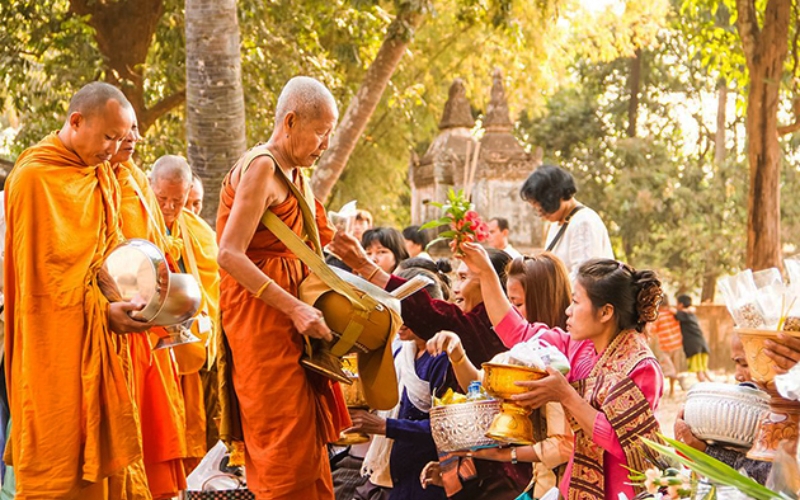
People offer food, flowers, candles and incense to monks as a way to accumulate merit
Main festivals in Laos
Boun Pi Mai
Boun Pi Mai is a traditional festival of Laos and is the most vibrant festival of the year. Boun Pi Mai is held in April every year according to the Buddhist calendar, attracting a large number of locals and tourists to participate, especially in Vang Vieng and Luang Prabang. The festival has 3 main days. On the first day, people will sprinkle scented water on Buddha statues, then they collect the water flowing from the statues and bring it back to water their families and friends to bless, clean and purify their bodies.
The second day is the main festival day. Instead of wishes, people splash water on each other to wish for all good things, pray for a lucky new year and favorable weather. In addition, they also splash water on their houses, pets, and worship items. They believe water will help wash away all evil and illness, wishing for a peaceful and healthy new year. On the last day, families will hold a Baci ceremony at home, give gifts to each other and go to the temple to listen to Buddhist teachings.
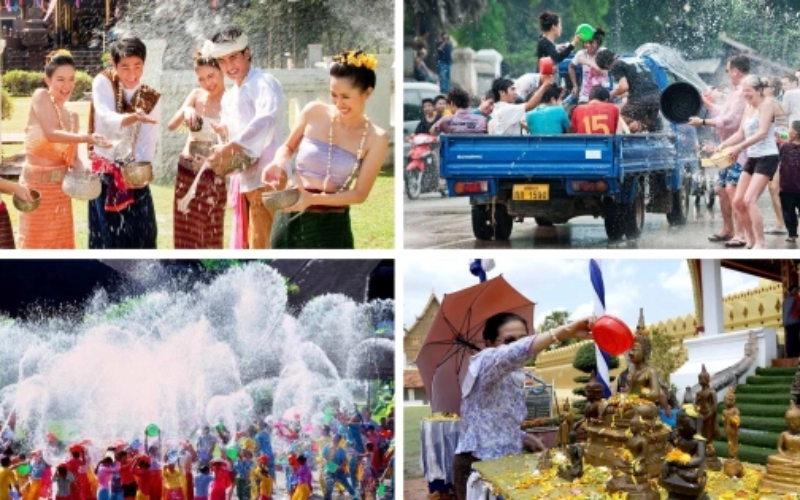
people splash water on each other to wish for all good things on Boun Pi Mai
Awk Phansa
Awk Phansa is a festival that marks the end of the Khao Phansa Buddhist Lent. On this day, people line up at temples from early morning and offer gifts to monks. At night, monks will perform a candlelight procession around the temple three times to commemorate the Buddha’s merits and remember his teachings.
Awk Phansa is also known as the Festival of Lights because during the festival, thousands of candles will be lit by people everywhere, creating an extremely brilliant and sacred space, from the streets, temples, houses to conservation areas,… In addition, within the framework of the festival, there are also activities such as boat racing, fire boat procession on the Mekong River, which are extremely attractive, attracting many local people and tourists to attend.
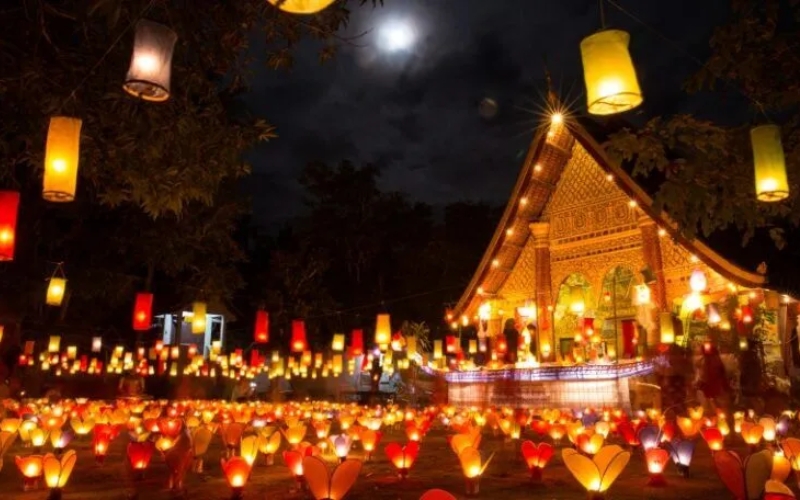
Thousands of candles are lit everywhere during Awk Phansa
Boun That Luang
Boun That Luang is one of the biggest Buddhist festivals in Laos, people from all over the country will flock to Pha Thatluang in Vientiane, the largest and most iconic temple. One of the highlights of the festival is the procession of Phasat Pheung. This is a model of the temple architecture made of yellow foam, surrounded by beeswax flowers and on the top of the tower are 9 white lotus flowers. The processions carry Phasat Pheung around Thatluang 3 times and then stop for monks to receive it.
Visitors to the festival can admire and participate in the procession as well as visit shopping stalls, enjoy traditional dishes and participate in cultural and artistic exchange activities.
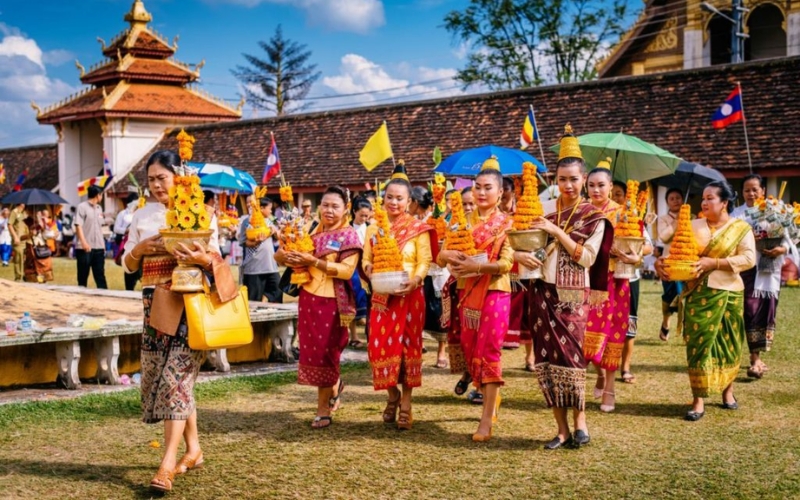
the procession of Phasat Pheung
Boun Suang Heua
Boun Suang Heua on the Mekong River is one of the major festivals of Laos that takes place at the end of the 3-month Lent. This is an opportunity for people to express their gratitude to heaven and earth and the river for blessing them with bountiful crops and a prosperous life. The Boun Suang Heua boat racing festival includes 3 main activities: a ceremony including food offerings and a candle procession around the pagoda, releasing lantern boats and the most prominent is the boat racing festival with 23 competing teams. The night before the competition, people gather on both sides of the river to release lanterns and pray for good things.
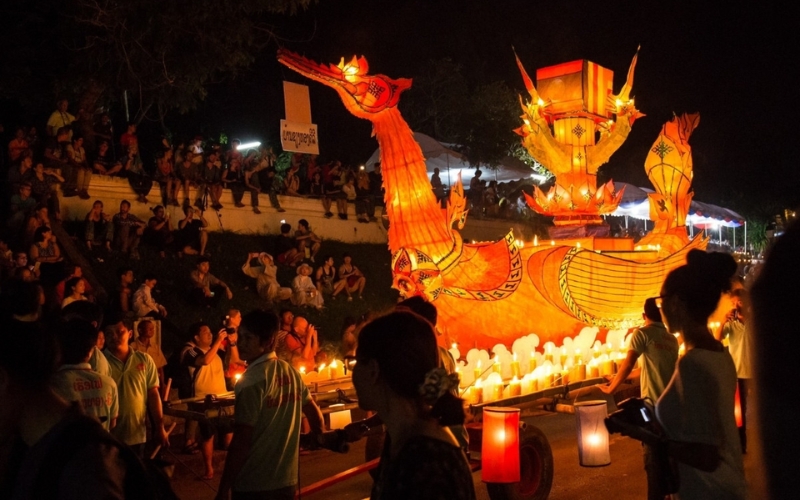
Boun Suang Heua in Luang Prabang
Boun Bang Fai
Another festival in Laos that you cannot miss is the Boun Bang Fai rain-praying fireworks festival, held on different days in May depending on the region. This festival is an opportunity for people to express their faith and gratitude to heaven, earth, nature and pray for a year of favorable weather, bountiful crops and a happy life.
During the festival, visitors will enjoy unique puppet shows, with the meaning of driving away evil spirits and bad luck. The main part of the festival is the rockets are activated and launched into the sky, creating a brilliant fireworks display. Before that, the cannon used in the festival is covered with colorful patterned cloth and carried around the village. If you want to participate in this festival, go to Naxone village, only about 50km from the capital, where the festival is held the largest in Laos.
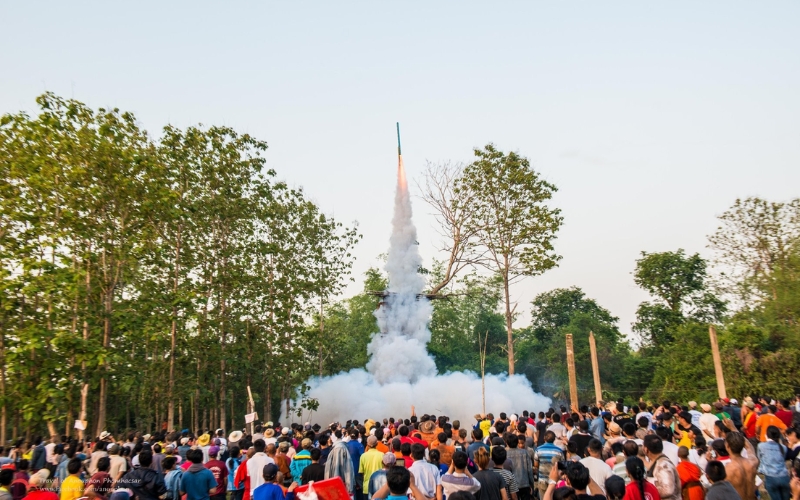
Boun Bang Fai, rocket festival
Boun Khao Padabdin
Boun Khao Padabdin is held in Luang Prabang to honor and remember those who have passed away and contributed to the country. During the ceremony, people will make offerings to thousands of monks who pass through the city at sunrise, creating an extremely sacred and solemn atmosphere. After that, people continue to perform other activities at the temple such as making offerings, listening to sermons, praying and lighting candles. There are also famous dragon boat races on the Nam Khan River. This festival is not only an opportunity for people to pay respect to their ancestors but also a place for the community to show solidarity, sharing and belief in a bright future.
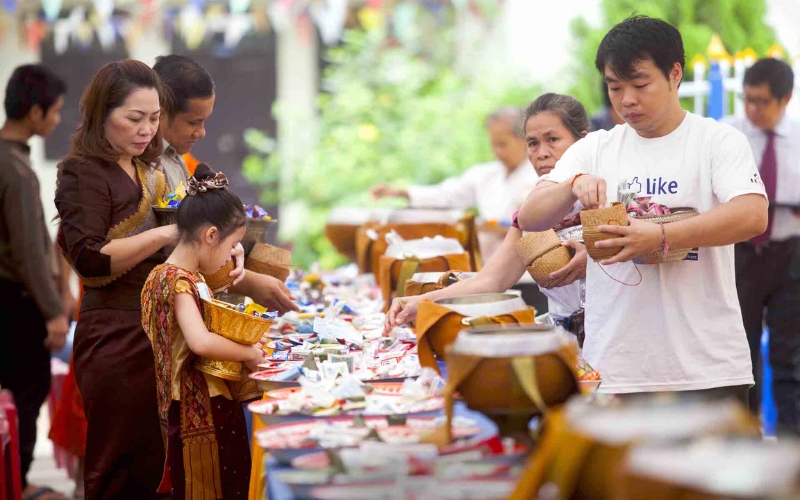
Boun Khao Padabdin is held in Luang Prabang
Boun Wat Phou
Boun Wat Phou is the largest festival in southern Laos, held at the UNESCO World Heritage site of Wat Pho. Held on the full moon day of the third lunar month, the festival attracts thousands of pilgrims and visitors to celebrate the spiritual significance of the site. Boun Wat Phou is both a tribute to the temple’s long history and a vibrant expression of contemporary Buddhist faith. Buddhist monks lead rituals including Tak Bat (alms-giving), prayers and meditation, creating an atmosphere of devotion and contemplation. The festival also features traditional Lao cultural performances, music and dance, along with festival markets offering local crafts, textiles and regional cuisine.
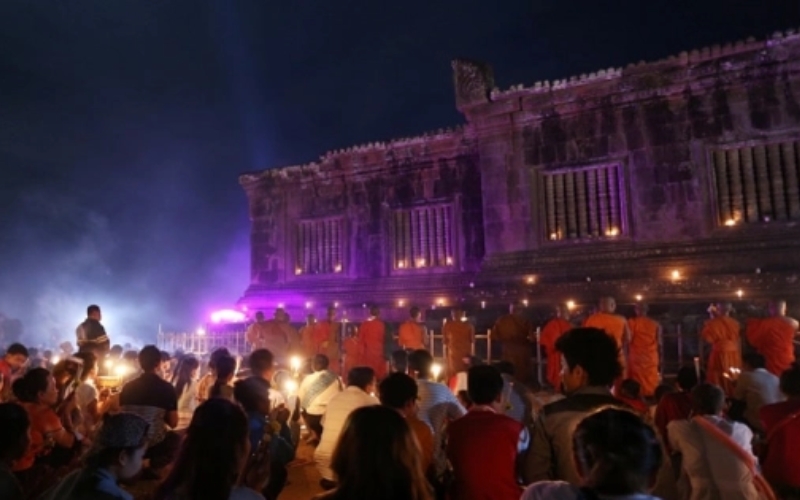
Boun Wat Phou
Travel tips for the best experience in Laos festivals
By following these tips, you can fully immerse yourself in the vibrant and spiritual atmosphere of Laos festivals, creating unforgettable memories and a deeper connection to this beautiful country.
- Plan your trip in advance: research festival dates in advance as they are often based on the lunar calendar and can change from year to year. Popular festivals such as That Luang and Boun Wat Phou attract visitors from all over Laos and beyond, so book your accommodation and transport in advance to avoid last-minute hassles.
- Respect temple etiquette and local customs: dress appropriately, especially when visiting temples or taking part in ceremonies. Take off your shoes before entering temples or sacred sites. Avoid touching Buddha statues or monks and follow any specific instructions given by temple staff or locals.
- Interact with locals: Participate in activities such as giving alms to monks, ceremonies or learning traditional dances. Learn a few simple phrases like “Sabaidee” (Hello) or “Khawp Jai” (Thank you) to communicate more friendly with locals and show respect. Interacting with locals can provide more insight into the cultural and spiritual significance of the festival.
- Prepare for crowds: Large festivals can attract large crowds, especially in popular cities like Vientiane and Luang Prabang. Arrive early to ensure a good spot for parades, festivals or cultural performances. Always carry important personal items to avoid losing or being stolen.
- Stay hydrated and protect yourself from the sun: Bring a reusable water bottle to stay hydrated and apply sunscreen, a wide-brimmed hat and sunglasses to protect yourself from the sun.
Festivals in Laos are more than just celebrations, they are a profound reflection of the country’s deep spirituality, rich traditions and vibrant community spirit. Let us guide you through these remarkable festivals, ensuring a seamless and unforgettable journey filled with cultural discovery and meaningful connections. Contact us now to begin your adventure into the spirit of Laos!
Read more:
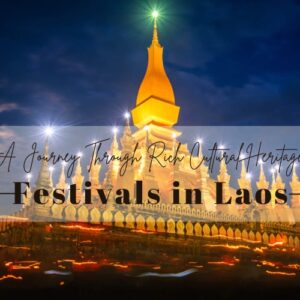

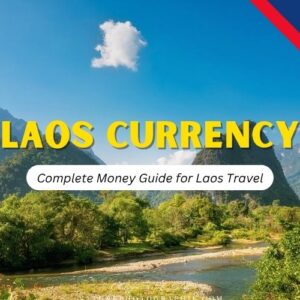
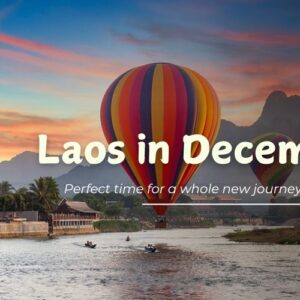
Great read! Which of these would you say is most family-friendly? I’ll be traveling with kids.
Dear Jade,
Thank you for your kind words! We’re glad you enjoyed the read.
For a family-friendly experience, we highly recommend the That Luang Festival in Vientiane. It offers a vibrant yet respectful cultural atmosphere, with beautiful processions, traditional music, and activities that are suitable for all ages. The setting around That Luang Stupa is also spacious and safe for children to explore. If your kids enjoy visual spectacles, the Lai Heua Fai (Boat Racing and Fire Festival) in Luang Prabang is another great option. It’s colorful, engaging, and held along the river, making for a truly memorable evening.
If you’d like help planning a family-friendly itinerary around one of these festivals, feel free to reach out — we’d be happy to assist!
Best regards,
IDC Travel Team
I had the chance to experience the Pi Mai Lao festival, and it was unforgettable! The water fights, cultural performances, and warm hospitality made it such a joyful celebration. Laos truly knows how to bring people together during its festivals!
Dear Peter,
Thank you for sharing your experience! The Pi Mai Lao festival truly captures the vibrant spirit and warm hospitality of Laos. If you plan to visit again, we’d love to help you explore more festivals or cultural highlights. Feel free to reach out for tailored travel experiences!
Best regards,
IDC Travel Team